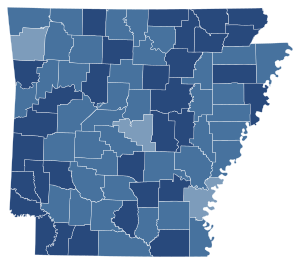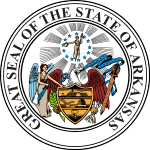2004 Arkansas Amendment 3
 From Wikipedia - Reading time: 8 min
From Wikipedia - Reading time: 8 min
| ||||||||||||||||||||||
Same-Sex Marriage Ban | ||||||||||||||||||||||
| Results | ||||||||||||||||||||||
|---|---|---|---|---|---|---|---|---|---|---|---|---|---|---|---|---|---|---|---|---|---|---|
| ||||||||||||||||||||||
 Yes
80–90%
70–80%
60–70% | ||||||||||||||||||||||
| Source: [1][2] | ||||||||||||||||||||||
| Elections in Arkansas |
|---|
 |
Constitutional Amendment 3 of 2004, is an amendment to the Arkansas Constitution that makes it unconstitutional for the state to recognize or perform same-sex marriages or civil unions. The referendum was approved by 75% of the voters.[3]
Contents
[edit]The text of the amendment states:[4]
Marriage. Marriage consists only of the union of one man and one woman.
- Marital status. Legal status for unmarried persons which is identical or substantially similar to marital status shall not be valid or recognized in Arkansas, except that the legislature may recognize a common law marriage from another state between a man and a woman.
- Capacity, rights, obligations, privileges, and immunities. The legislature has the power to determine the capacity of persons to marry, subject to this amendment, and the legal rights, obligations, privileges, and immunities of marriage.
Results
[edit]| Choice | Votes | % |
|---|---|---|
| 753,770 | 74.95 | |
| No | 251,914 | 25.04 |
| Total votes | 1,005,684 | 100.00 |
| Registered voters/turnout | 1,969,208 | 51.07 |
May 2014 Court Ruling on Amendment 3 and Arkansas Statutes
[edit]On May 9, 2014, Sixth Judicial Circuit Judge Chris Piazza ruled the ban on same-sex marriage in the state of Arkansas was unconstitutional, which legalized same-sex marriage in the state. Previously same-sex marriage was banned by both state statute and the state constitution in Arkansas. Subject to court stays and appeals.[5]
See also
[edit]References
[edit]- ^ Proposed Constitutional Amendment No. 3 - Certified
- ^ 2004 General Election and Non-Partisan Judicial Runoff Voter Turnout
- ^ CNN.com Election 2004 - Ballot Measures Accessed 30 November 2006.
- ^ Arkansas State Constitution Archived October 3, 2008, at the Wayback Machine, 83rd Amendment, Arkansas Legislature. Accessed 18 December 2006.
- ^ "Arkansas judge strikes down state ban on same-sex marriage". Reuters. May 9, 2014. Retrieved May 9, 2014.
External links
[edit]- The Money Behind the 2004 Marriage Amendments Archived 2012-03-28 at the Wayback Machine OpenSecrets
Licensed under CC BY-SA 3.0 | Source: https://en.wikipedia.org/wiki/2004_Arkansas_Amendment_39 views | Status: cached on November 26 2024 09:36:01↧ Download as ZWI file
 KSF
KSF